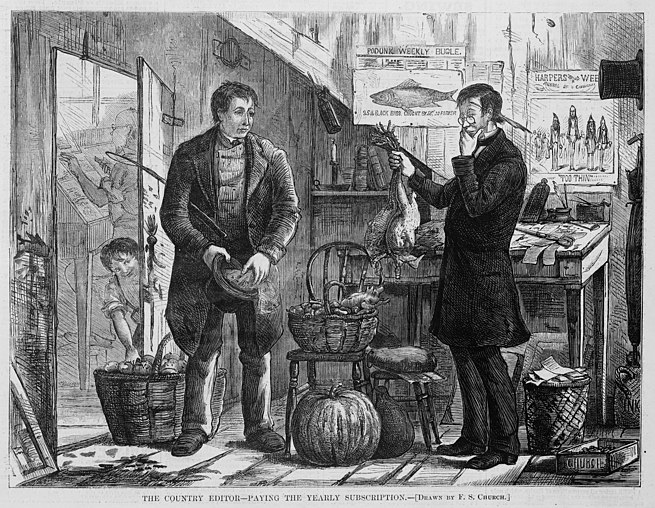
-
Barter
In trade, barter (derived from baretor) is a system of exchange where participants in a transaction directly exchange goods or services for other goods or services without using a medium of exchange, such as money. Economists distinguish barter from gift economies in many ways; barter, for example, features immediate reciprocal exchange, not delayed in time. Barter usually takes place on a bilateral basis, but may be multilateral (i.e., mediated through a trade exchange). In most developed countries, barter usually only exists parallel to monetary systems to a very limited extent. Market actors use barter as a replacement for money as the method of exchange in times of monetary crisis, such as when currency becomes unstable (e.g., hyperinflation or a deflationary spiral) or simply unavailable for conducting commerce.
Economists since the times of Adam Smith (1723-1790), looking at non-specific pre-modern societies as examples, have used the inefficiency of barter to explain the emergence of money, of “the” economy, and hence of the discipline of economics itself. However, ethnographic studies have shown that no present or past society has used barter without any other medium of exchange or measurement, nor have anthropologists found evidence that money emerged from barter, instead finding that gift-giving (credit extended on a personal basis with an inter-personal balance maintained over the long term) was the most usual means of exchange of goods and services.
-
Bargain (noun)
An agreement between parties concerning the sale of property; or a contract by which one party binds himself to transfer the right to some property for a consideration, and the other party binds himself to receive the property and pay the consideration.
-
Bargain (noun)
An agreement or stipulation; mutual pledge.
-
Bargain (noun)
An item purchased for significantly less than the usual, or recommended, price
-
Bargain (noun)
A gainful transaction; an advantageous purchase.
“to buy a thing at a bargain”
“At that price, it’s not just a bargain, it’s a steal.”
-
Bargain (noun)
The thing stipulated or purchased.
-
Bargain (verb)
To make a bargain; to make a deal or contract for the exchange of property or services; to negotiate
“They had to bargain for a few minutes to get a decent price for the rug.”
-
Bargain (verb)
To transfer for a consideration; to barter; to trade
-
Barter (noun)
An exchange of goods or services without the use of money.
“We had no money so we had to live by barter.”
-
Barter (noun)
The goods or services used in such an exchange.
“The man used his watch as barter to pay for his tab.”
-
Barter (verb)
To exchange goods or services without involving money.
“She bartered a bonsai for one of the rare books in my library.”
“You may be able to barter for some of the items you need at the local market.”
-
Barter (verb)
exchange (goods or services) for other goods or services without using money
“he often bartered a meal for drawings”
“they were able to buy or barter for most of what they needed”
-
Barter (noun)
the action or system of bartering
“paper money ceases to have any value and people resort to barter”
-
Barter (noun)
goods or services used in bartering
“I took a supply of coffee and cigarettes to use as barter”
